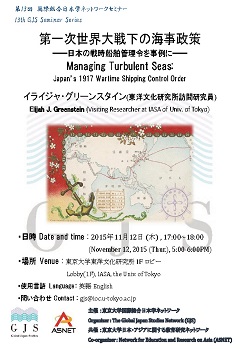以下の通り、第129回目のGJS主催、東文研・ASNET共催セミナーを開催します
【日時 / Date】
2015年 11月 12日(木) 17:00-18:00
Nov 12 (Thu), 2015, 5:00-6:00 p.m.
【会場 / Venue】
東京大学 東洋文化研究所 1階 ロビー
Ground Floor, Institute for Advanced Studies on Asia, The University of Tokyo
【報告者】
イライジャ・グリーンスタイン氏(東洋文化研究所訪問研究員)
Elijah J. Greenstein (Visiting Researcher at IASAof Univ. of Tokyo)
【題名 / Title】
第一次世界大戦下の海事政策――日本の戦時船舶管理令を事例に
Managing Turbulent Seas: Japan’s 1917 Wartime Shipping Control Order
【要旨 / Abstract】
第一次世界大戦は日本の海運業が未曾有の活況を与える機会となった。戦争の勃発以後、西欧船舶の多くがそれぞれ本国の軍事に徴用又は他国港で抑留されるのに伴い、世界中で深刻な船舶不足が生じた。それによる傭船料・運賃料の高騰に応じて、日本の海運業者が航路を拡張し、巨利を博した。しかし、日本船舶が益々交戦国を始め外国にチャーターされる一方、日本の港には滞貨が山積みになっていった。これらの船腹を調節するため、日本政府は1917年9月に緊急勅令として「戦時船舶管理令」を発布した。本発表は、同「管理令」を扱いながら、第一次世界大戦が日本の海運業の発展にどのような意義を持つのかを探究する。
The First World War created unprecedented opportunities for Japanese shipping. German ships were detained in foreign ports or bottled up in home waters by the British navy, while London diverted the British Empire’s massive merchant marine to the war trade. Severe shortages of tonnage resulted, and as charter and freight rates soared, Japanese shipowners dispatched ships around the world in pursuit of profits. As those ships were increasingly chartered out to foreign states and businesses, however, undelivered cargo accumulated in Japan’s ports. In order to adjust the distribution of Japanese tonnage, the government issued the Wartime Shipping Control Order in September 1917, through which the Ministry of Communications asserted wide-ranging authority over charters, freight rates, and voyages. This presentation takes that shipping control order as a starting point from which to explore the significance of WWI for Japan’s shipping industry.
※ 報告は英語で行われます。
The seminar will be held in Engslish.


